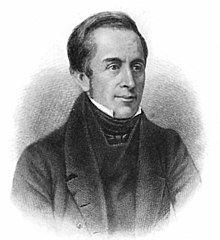Thomas Hood
Thomas Hood (born May 23, 1799 in London , † May 3, 1845 in London) was an English writer and humorist .
Thomas Hood was a merchant for a short time, then an engraver, and since 1821 exclusively a writer. After contributing to fiction papers at an early age, he took over the editing of London Magazine , later founded Hood's Magazine and eventually headed New Monthly . His excellent humor was shown in the poetry collection Whims and oddities (1827), in the satire of the English tourists Up the Rhine (1840) and in the Comic Annual . The plea of the midsummer fairies (1828) is a creation of the imagination . But melancholy was also his own, and it made him a poet of social misery. This includes the ballad The dream of Eugene Aram (1829) as well as the romances The song of the shirt (1843 in Punch ), which describes the plight of the London seamstresses, and The bridge of sighs (1845; both in German by Ferdinand Freiligrath ).
In the prosaic tale, Hood was less happy. An edition of his works appeared in ten volumes from 1869 to 1873, a selection in 1875, Poems (illustrated) London 1880. Hermann Harrys (Hanover 1859) translated the most important poems into German.
His son Tom Hood was a humorist and illustrator.
Web links
- Literature by Thomas Hood in the catalog of the Berlin State Library
- Literature by and about Thomas Hood in the catalog of the German National Library
| personal data | |
|---|---|
| SURNAME | Hood, Thomas |
| BRIEF DESCRIPTION | English writer and humorist |
| DATE OF BIRTH | May 23, 1799 |
| PLACE OF BIRTH | London |
| DATE OF DEATH | May 3, 1845 |
| Place of death | London |
